What is Project Management? The Complete First Guide for Newbies
Explore the essentials of project management. Learn what project management is, why it's important, key methodologies, tools, and tips.
What is project management? In simple terms, it’s the process of planning, organizing, and managing work to achieve specific goals within set deadlines and budgets. Whether it’s building a new app, running a marketing campaign, or organizing an event, project management ensures tasks, people, and resources are aligned for success.
This guide explains everything beginners need to know—what defines a project, why project management is important, its key components, and the methods and tools used by professionals today.
What is a Project?
A project is a temporary effort undertaken to create a unique product, service, or result. It has specific objectives and a defined start and end date. Projects typically involve a set of tasks or activities that are coordinated to achieve a particular goal or solve a problem.
For example:
- Building a New Website: Developing a fully functional website with specific design elements, content, and performance goals.
- Developing a Marketing Campaign: Creating a targeted promotional campaign with defined messaging, channels, and success metrics.
- Launching a New Product: Introducing a product to the market, including design, testing, and marketing phases.
Projects are essential for driving innovation, implementing change, and achieving strategic business goals, regardless of industry.
Types of Projects
Projects come in many forms, depending on their purpose, size, and industry. While every project is unique, most can be grouped into a few common categories:
- Business Projects: These focus on improving performance or driving growth within an organization. (Example: launching a new product, or entering a new market)
- Construction Projects: Centered on physical structures and infrastructure. (Example: building a bridge, office complex, or residential community.)
- IT & Software Projects: Focused on developing or upgrading technology solutions.(Example: creating a mobile app, or improving cybersecurity.)
- Marketing Projects: Designed to promote brands, products, or services to target audiences.(Example: running a social media campaign or rebranding a company).
- Research & Development (R&D) Projects: Dedicated to innovation, discovery, and testing new ideas.(Example: developing prototypes, or creating new technologies).
- Personal Projects: Individual initiatives outside of work or business settings.(Example: planning a wedding, renovating a home, or learning a new course).
What is Project Management?
Project management is the discipline of planning, organizing, and guiding work to achieve a specific goal within a defined scope, time, and budget. It provides structure to complex work, ensuring projects are delivered efficiently and successfully.
Unlike routine operations, project management focuses on temporary efforts—projects that have a clear beginning, end, and desired outcome. It’s about aligning people, resources, and processes so that work is completed on time, within budget, and up to expectations.
Check out our short video on What is Project Management to see how projects are planned, organized, and delivered step by step.
A Short History of Project Management
Project management has evolved over centuries. In ancient times, massive efforts like the pyramids or cathedrals relied on early coordination methods. By the early 1900s, modern practices began with Henry Gantt’s chart and Frederick Taylor’s focus on efficiency.
The 1950s and 1960s introduced structured techniques such as PERT and Critical Path Method, widely used in defense and engineering. In the 1980s and 1990s, project management became standardized through PMI and the PMBOK guide, spreading across many industries.
Today, with Agile, Scrum, Kanban, and digital platforms, project management emphasizes flexibility, collaboration, and technology-driven approaches.
Importance of Project Management
Project management has become more critical than ever due to evolving business dynamics, technological advancements, and shifting workplace structures. Here’s why effective project management is essential:
1. Managing Hybrid and Remote Teams Effectively
With the rise of hybrid and fully remote work environments, project management ensures seamless collaboration across distributed teams.
Besides that, modern project management tools help teams stay organized and aligned despite working from different locations. (Discover more Top Project Management Softwares for Remote Teams)
2. Adapting to Technological Advancements
As technology rapidly evolves, project management tools are becoming smarter. AI Project Management Tools now automate tasks, track progress, and predict risks in real time, improving efficiency.
For project managers, adopting these technologies is essential to stay competitive. They provide valuable insights, streamline workflows, and allow teams to focus on more strategic aspects of the project. By embracing these advancements, project managers can ensure smoother execution and better outcomes.
3. Handling Increased Project Complexity
Modern projects often involve multiple stakeholders, global teams, and cross-department collaboration. Project management frameworks help break down complex tasks into manageable phases, ensuring clarity and focus throughout the project.
4. Ensuring Cost and Resource Efficiency
Effective project management helps prevent budget overruns by closely monitoring expenses and optimizing resource allocation. Proper resource management ensures tasks are assigned based on team members’ skills and availability, preventing burnout and inefficiencies.
Key Components of Project Management
Every successful project is built on a foundation known as the Triple Constraint, a core framework that balances three critical elements:
- Scope - Defines the boundaries of the project, including what will and won’t be included. Managing scope ensures the project stays focused on its goals and avoids unnecessary additions (scope creep).
- Time - The schedule for the project, outlining start and end dates, deadlines, and milestones. Time management ensures that tasks are completed on time and the project stays on track.
- Cost - Involves budgeting, monitoring expenses, and ensuring that the project is completed within the allocated budget. Effective cost management prevents budget overruns and resource wastage.
- Quality - Ensures the project meets the required standards and delivers the expected outcomes. Quality management involves setting benchmarks and maintaining high standards throughout the project.
- Resources - Managing human, financial, and material resources effectively. Ensuring tasks are assigned based on skills and availability helps avoid inefficiencies and overwork.
- Risk - Identifying, assessing, and managing risks that could affect the project’s success. Effective risk management involves planning for potential issues and mitigating them before they arise.
- Stakeholders - Managing communication and expectations with stakeholders—clients, team members, and anyone else involved or impacted by the project.
What Do Project Managers Do?
A Project Manager (PM) oversees the entire project lifecycle, ensuring tasks are completed on time, within budget, and meet quality standards. They act as the central point for planning, executing, and closing projects while managing teams and stakeholder expectations.
Curious about What Does A Project Manager Do? Dive deeper into their roles and responsibilities in our full blog post.
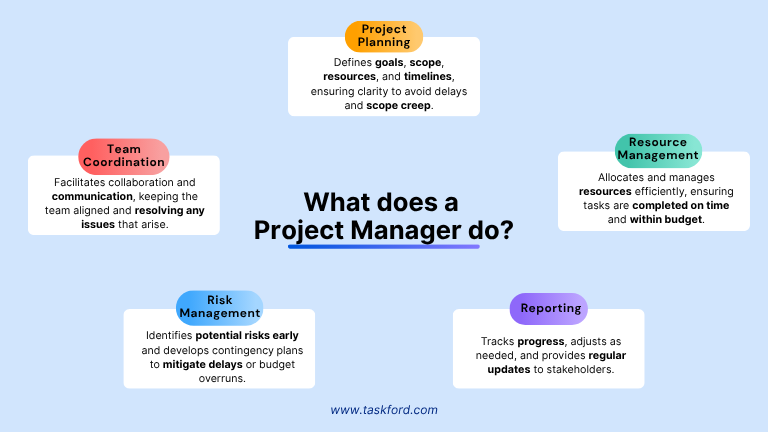
Core Responsibilities of a Project Manager:
- Defining Objectives & Scope: Clarify project goals, deliverables, and success criteria to avoid scope creep.
- Project Planning & Scheduling: Next, the PM develops detailed timelines, assigns tasks, and creates comprehensive project plans. Tools like Gantt charts help visualize schedules and track progress.
- Resource & Budget Management: Additionally, project managers allocate resources efficiently and monitor costs. By doing so, they prevent overspending and ensure optimal use of time, people, and materials.
- Risk Management: Moreover, they identify potential risks early, assess their impact, and create contingency plans to minimize disruptions and maintain project continuity.
- Team Leadership: Motivate teams, ensure collaboration, and resolve conflicts.
Learn more The 7 Key Skills Needs for Project Management.
Essential Project Management Methodologies
Project management methodologies are structured approaches that guide how projects are planned, executed, and monitored. They provide frameworks to help teams manage tasks, resources, timelines, and risks effectively. Choosing the right methodology depends on the project type, complexity, and organizational needs.
1. Waterfall Methodology
The Waterfall Methodology is one of the earliest project management methodologies and follows a linear, sequential approach. Each phase of the project must be completed before the next one begins, creating a clear step-by-step process. This method is highly structured, focusing on careful planning, clear documentation, and sticking closely to the project requirements from the start.
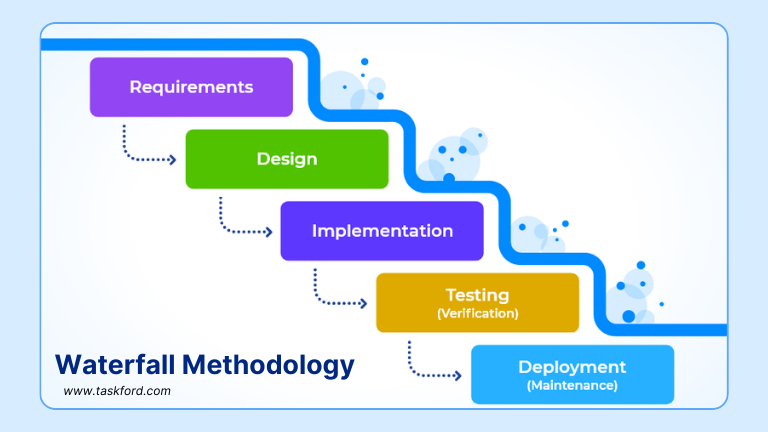
Key Phases of Waterfall:
- Requirement Analysis: Gather and document all project requirements. This phase defines exactly what the project must deliver.
- System Design: Create detailed designs and specifications for the project, including technical architecture and workflow plans.
- Implementation (Development): The actual creation or building of the product according to the design specifications.
- Testing: Verify that the product meets all requirements and functions correctly. Identify and fix any defects or errors.
- Deployment: Deliver the finished product to the customer or end-user.
When to Use Waterfall:
- Projects with clear, fixed requirements that are unlikely to change.
- Projects where predictability and strict documentation are critical, such as construction, manufacturing, or large-scale engineering projects.
- Scenarios where stakeholders require detailed documentation and sign-offs at each phase.
Common Use Cases:
Waterfall is ideal for projects with clear, fixed requirements. Common examples include construction, manufacturing, engineering, regulatory projects, and software projects where changes are minimal.
2. Agile Methodology
The Agile Methodology is a flexible and iterative approach to project management. Unlike Waterfall, Agile focuses on delivering work in small, incremental cycles, called sprints, allowing teams to adapt quickly to changes and evolving requirements. It emphasizes collaboration, customer feedback, and continuous improvement throughout the project lifecycle.

Key Principles of Agile
- Iterative Development: Work is delivered in short cycles (sprints), enabling frequent evaluation and adjustments.
- Collaboration: Teams and stakeholders work closely together to ensure alignment and quick decision-making.
- Customer Feedback: Regular feedback loops help refine the product and meet user needs effectively.
- Adaptability: Agile welcomes changes in requirements, even late in the project.
- Continuous Improvement: Teams regularly reflect on performance and processes to improve efficiency.
When to Use Agile
- Projects with evolving or unclear requirements.
- Projects that require frequent updates and feedback from stakeholders or customers.
- Work that benefits from team collaboration, flexibility, and rapid delivery. Examples: software development, digital marketing campaigns, or creative projects.
Common Use Cases
Agile is widely used in industries where change is constant and rapid delivery is essential. Typical examples include software development, product design, marketing initiatives, and innovation-driven projects.
Explore the essentials of Agile Project Management in this beginner-friendly guide.
3. Scrum Framework
Scrum is a framework under Agile that organizes work into short, time-boxed sprints (usually 2-4 weeks). Teams work collaboratively, focusing on a specific set of deliverables within each sprint.
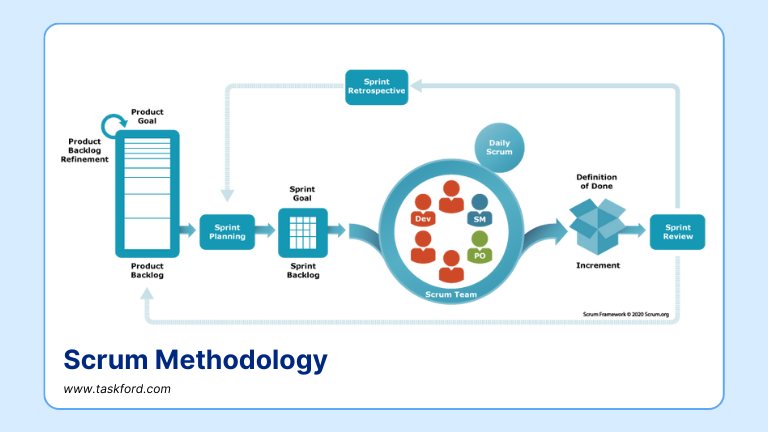
Key Elements of Scrum
- Sprints: Short, time-boxed iterations (usually 1–4 weeks) in which a set of tasks is completed and reviewed.
- Roles:
- Product Owner: Defines the product vision, prioritizes tasks, and ensures the team delivers value.
- Scrum Master: Facilitates the process, removes obstacles, and ensures Scrum principles are followed.
- Development Team: Cross-functional members who execute tasks and deliver increments.
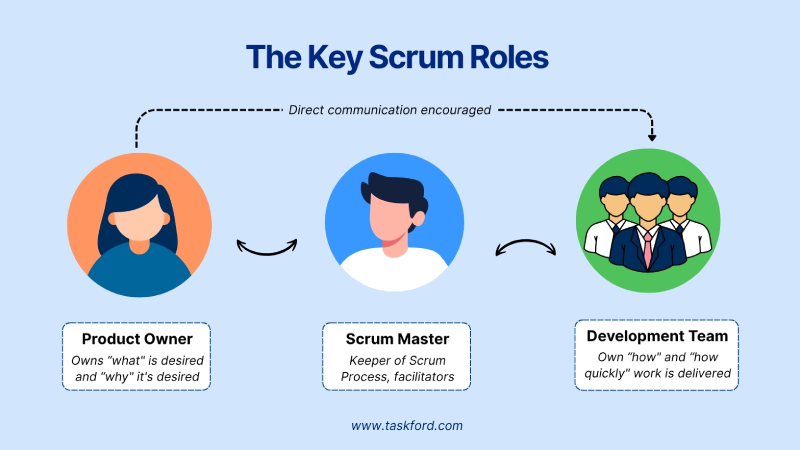
-
Artifacts:
- Product Backlog: A prioritized list of project requirements or features.
- Sprint Backlog: Tasks selected for completion in a sprint.
- Increment: The usable product or deliverable produced at the end of a sprint.
-
Ceremonies: Regular meetings that maintain alignment and transparency. (Learn more about Agile Ceremonies)
- Sprint planning, Daily Stand-ups, Sprint Review, and Sprint Retrospective.
When to Use Scrum
- Projects with rapidly changing or evolving requirements.
- Teams that benefit from frequent feedback and collaboration.
- Work that requires incremental delivery and early validation of results.
Common Use Cases
Scrum is widely used in software development, product design, marketing campaigns, and innovation-driven projects where adaptability and frequent delivery are critical.
4. Kanban Approach
The Kanban approach is a visual project management method that focuses on workflow optimization and continuous delivery. Unlike Waterfall or Scrum, Kanban does not use fixed iterations; instead, it emphasizes visualizing tasks, limiting work in progress, and improving efficiency over time.

Key Elements of Kanban
- Visual Boards: Tasks are represented as cards on a board, typically divided into columns like To Do → In Progress → Done.
- Work in Progress (WIP) Limits: Limit the number of tasks in each stage to prevent bottlenecks and ensure smooth workflow.
- Continuous Flow: Tasks move through the board as they progress, promoting a steady flow of work rather than time-boxed sprints.
- Metrics and Feedback: Track key performance indicators like cycle time and lead time to continuously improve processes.
When to Use Kanban
- Projects with continuous workflows rather than fixed deadlines.
- Teams that need flexibility and real-time visualization of work.
- Environments focused on process efficiency and incremental improvement.
Common Use Cases
Kanban is popular in software development, IT operations, customer support, marketing workflows, and manufacturing, where teams benefit from visual task tracking and optimizing work in progress.
5. Hybrid Methodologies
The Hybrid Methodology combines elements of both traditional (Waterfall) and Agile approaches to create a flexible framework that adapts to the needs of specific projects. This means teams can plan the project in advance while still adapting to changes along the way.

Key Elements of Hybrid Methodologies
- Structured Planning + Iterative Delivery: High-level planning is done upfront, but tasks are executed in short, iterative cycles.
- Flexible Scope Management: While the overall project scope is defined, Agile principles allow adjustments as requirements evolve.
- Integrated Roles and Processes: Teams may use Scrum or Kanban practices within larger Waterfall phases to manage workflow efficiently.
- Continuous Feedback: Stakeholder feedback is incorporated throughout the project, improving adaptability and final outcomes.
When to Use Hybrid Methodologies
- Projects that need both structure and flexibility.
- Large projects with fixed deadlines but changing requirements in some areas.
- Teams that want to combine planning with adaptability.
Common Use Cases
Hybrid is used in software projects with regulations, IT implementations, product launches, and complex business projects where both planning and flexibility are important.
Selecting the right methodology ensures better project control, enhanced collaboration, and improved outcomes and beyond.
The Model Project Lifecycle: A Real-World Framework
The Project Management Life Cycle is a structured approach that guides projects from inception to completion, ensuring systematic progress and successful outcomes. It comprises five key phases:
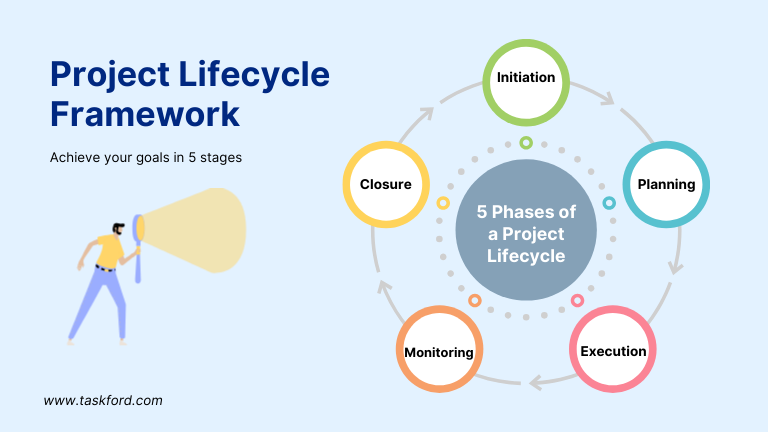
- Initiation: Assess project feasibility, define clear objectives, identify stakeholders, and create a project charter. This phase sets the foundation and ensures alignment on project goals.
- Planning: Develop a detailed roadmap covering project scope, timelines, budgets, resource allocation, and risk management. Effective planning reduces uncertainty and prepares the team for execution.
- Execution: Implement the project plan by assigning tasks, coordinating team activities, and maintaining clear communication. The focus is on producing deliverables while keeping the team aligned and productive.
- Monitoring & Controlling: Continuously track progress against the plan, manage changes, address risks, and maintain quality standards. This ensures the project stays on schedule, within budget, and meets stakeholder expectations.
- Closure: Finalize all deliverables, obtain stakeholder approvals, release resources, and document lessons learned. This phase provides an opportunity to evaluate success and identify improvements for future projects.
For a more detailed exploration of each phase, refer to the comprehensive guide about the project lifecycle.
Best Project Management Software 2026
1. TaskFord
TaskFord is a comprehensive project management and resource planning platform designed to support teams of all sizes. It helps organizations efficiently manage projects, track progress, and optimize resources while keeping teams aligned. TaskFord enables seamless collaboration across departments, whether in IT, Operations, Marketing, or Sales. The platform’s flexibility makes it ideal for both small teams and large, cross-functional groups, providing tools for task management, time tracking, reporting, and much more.
With TaskFord, you can expect:
- Advanced Project Management: TaskFord helps you manage every stage of the project lifecycle, from planning to delivery. With features like task assignments, milestone tracking, and Gantt Chart view for timeline visualization, it ensures projects stay on track and teams remain aligned throughout execution.
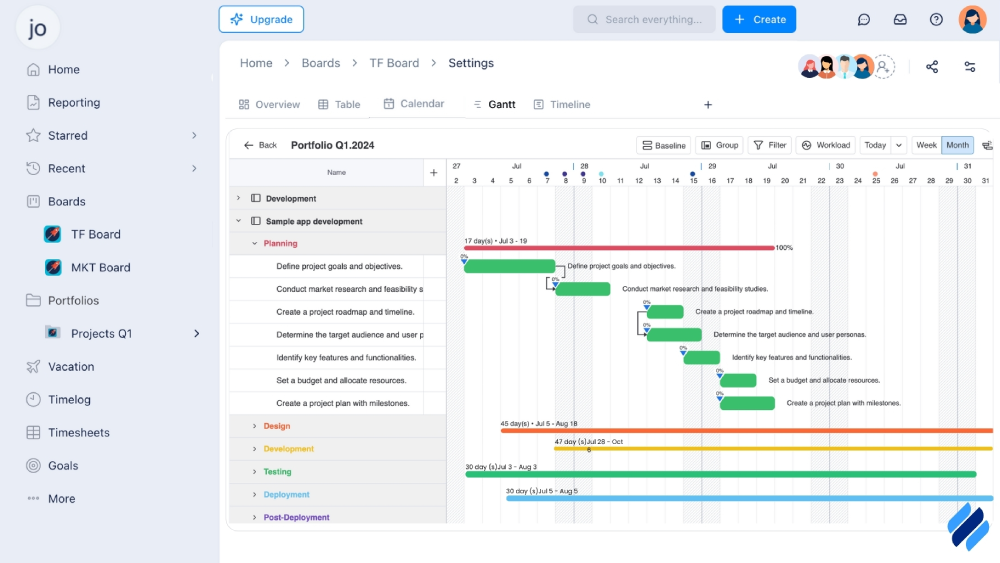
- Comprehensive Resource Planning: TaskFord enables you to optimize team allocation and manage workloads efficiently. By providing clear visibility into resource availability, it ensures a balanced distribution of tasks across projects, preventing overloading and improving team productivity.
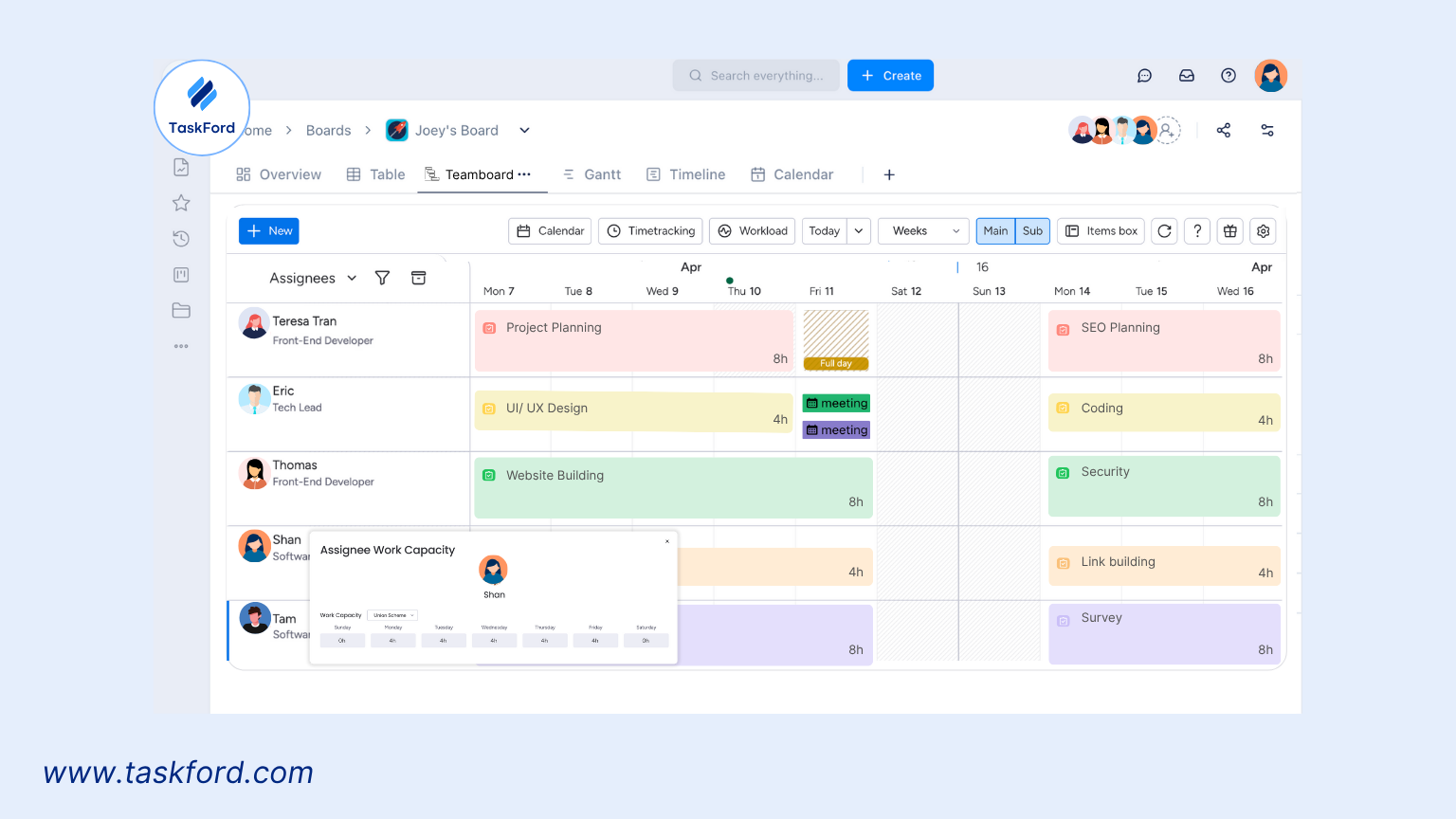
- Project Portfolio Management: TaskFord allows you to oversee multiple projects at once, giving you a centralized view of all ongoing initiatives. Track progress, allocate resources, and prioritize projects based on business objectives, ensuring that each project aligns with your broader goals. This feature helps you make informed decisions and manage your entire project portfolio with efficiency.
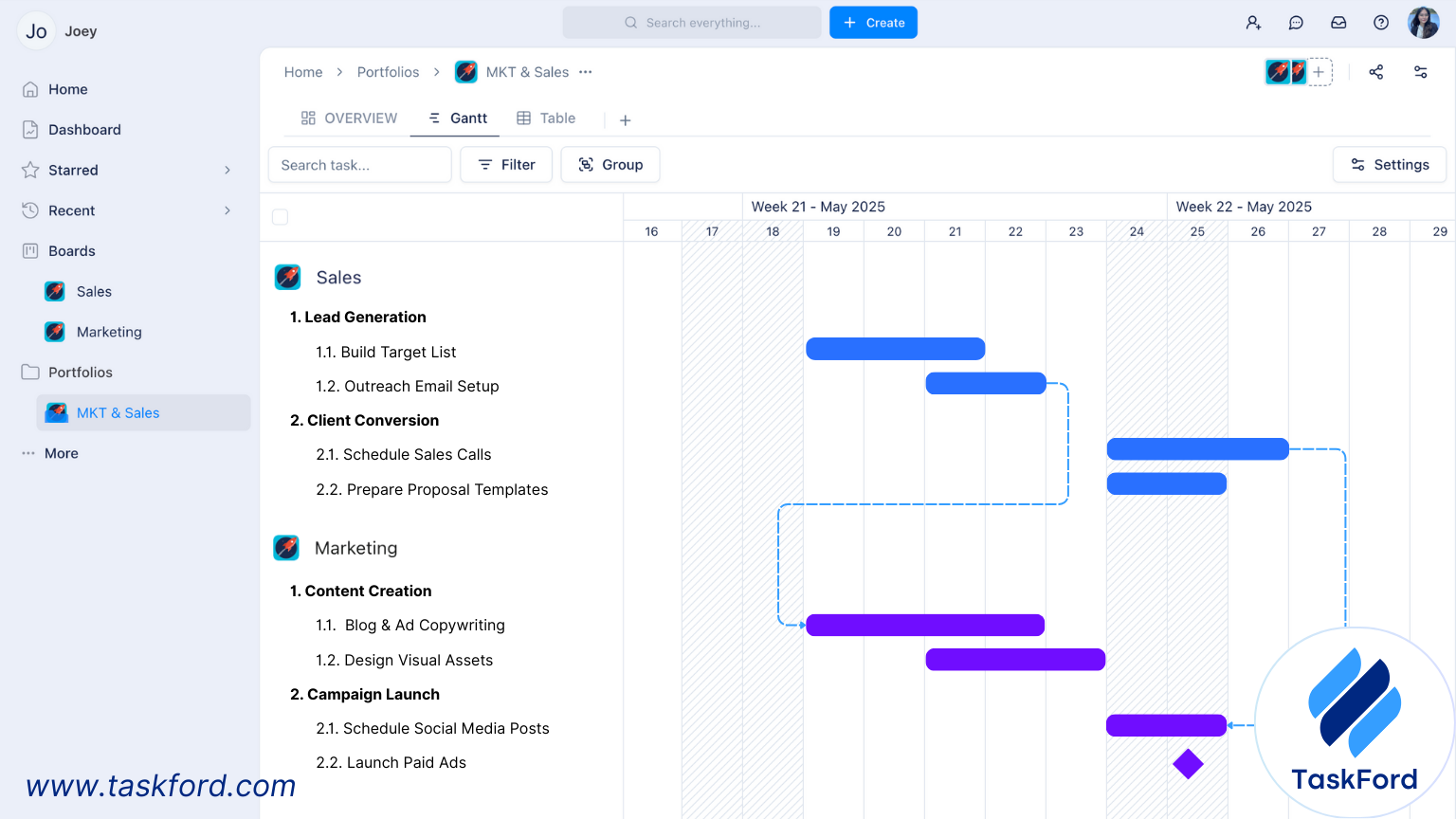
- Real-Time Collaboration: Streamline communication with built-in messaging, file sharing, and updates, keeping teams aligned no matter where they work.
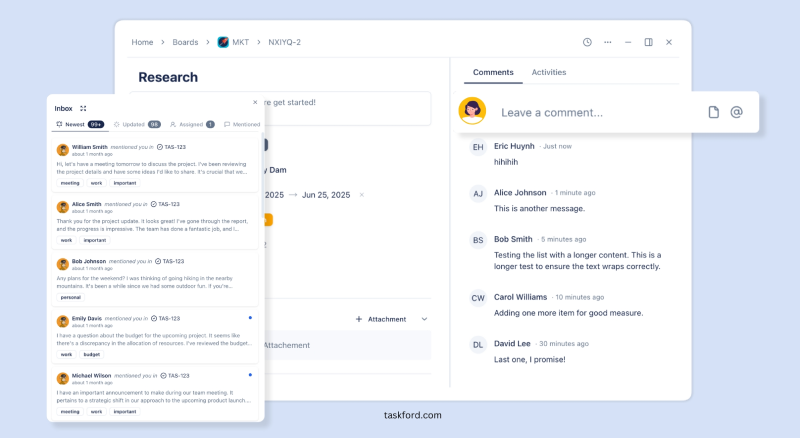
- Custom Dashboards & Reporting: Gain real-time insights with customizable dashboards and detailed reports to monitor performance and adjust strategies.
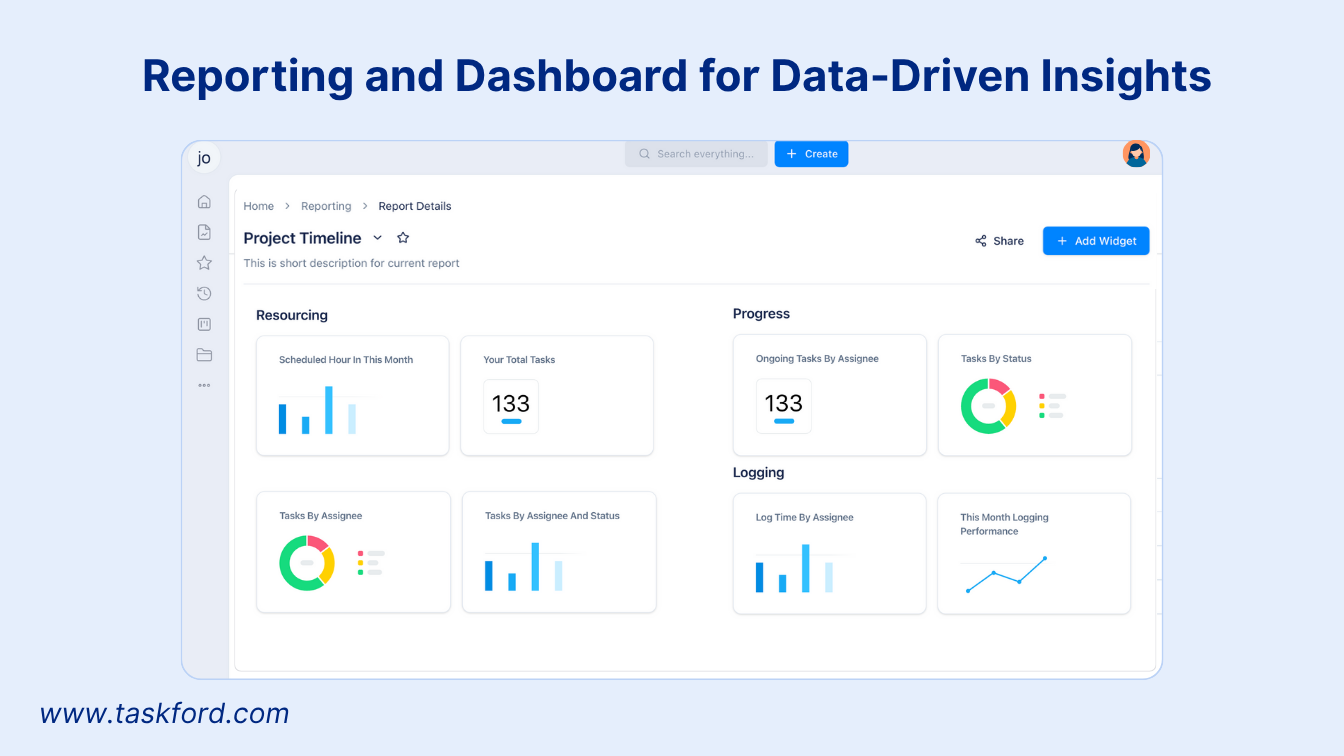
- Time & Budget Control: Monitor time spent and stay within budget, ensuring projects remain on track financially.
![]()
- Scalability for All Teams: From small groups to large enterprises, TaskFord adapts to any team size and workflow.
2. Monday.com
Known for its user-friendly interface and versatility, monday.com provides customizable workflows, various project views (such as Kanban and Gantt), and robust collaboration tools. It suits teams seeking an intuitive platform with strong automation features.
3. ClickUp
ClickUp is recognized for its comprehensive set of task and project management tools, real-time collaboration features, and competitive pricing plans. It offers customizable views, including List, Board, Calendar, and Gantt, along with native time tracking and powerful automation capabilities.
4. Asana
Asana excels in task management and team collaboration, offering features like task dependencies, timeline views, and project milestones. Its user-friendly interface and integration capabilities make it ideal for teams focused on productivity and communication.
5. Wrike
Wrike is a robust platform suitable for cross-functional collaboration, providing customizable dashboards, Gantt charts, and real-time reporting. It’s designed to handle complex project requirements and is favored by large organizations.
Learn more: Top Project Management Tools for Remote Teams
Conclusion
Project management remains the backbone of successful project delivery across all industries. Whether you’re managing a small creative project or a large-scale enterprise initiative, mastering project management principles, choosing the right methodology, and leveraging modern tools can significantly impact your project’s success.
Related Resources:
- AI project management - How AI is Revolutionizing Project Management
- Gantt Chart for Multiple Projects - Step-by-Step Guide with Examples
- Enterprise Resource Planning - Explore its types and differences
- Project Management Scheduling Software - 5 Features You Shouldn’t Compromise On
- Small Business Time Tracking Comparison 2025-2026
Subscribe for Expert Tips
Unlock expert insights and stay ahead with TaskFord. Sign up now to receive valuable tips, strategies, and updates directly in your inbox.